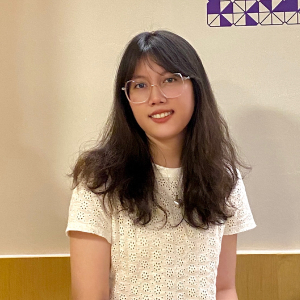Ph.D. in Artificial Intelligence and Computer Engineering (AiCE)
PhD Degree

Free consultation for this program
We are ready to help you with your difficulties and processing.
Duration
Not provided yet
Study Format
Not provided yet
No. of Student Mentors
53
Total Tuition Fees
271,000 THB





Free consultation for this program
We are ready to help you with your difficulties and processing.
Duration
Not provided yet
Study Format
Not provided yet
No. of Student Mentors
53
Total Tuition Fees
271,000 THB





Program
Key information
University
Program structure
Tuition fees
Admissions
Possible Career Pathway
Student's testimonials
F&Qs
ABOUT THIS PROGRAM
Doctor of Philosophy in Artificial Intelligence and Computer Engineering
96 units technical courses (48units for students with MS) + Qual + Thesis Proposal/Defense); with breadth course options in
Artificial Intelligence
Human-centered Design
Scalable System and
Cybersecutiry
Students in the AiCE Ph.D. Program will undertake a research-intensive study of the fundamentals of Artificial and Computer Engineering. During the course of obtaining the Ph.D. degree, students will create and disseminate knowledge in their chosen area of study.
KEY INFORMATION
Degree
Not provided yet
Language
Not provided yet
Location
Bangkok
Start Date
03 August
Study Format
Not provided yet
Duration
Not provided yet
Program Highlight
Not Provided Yet
Total Semester
Not provided yet
Total Tuition Fees
271,000 THB Per Semester
Application deadline
Nov 2025
ABOUT UNIVERSITY

1 Soi Chalongkrung 1, Ladkrabang, Bangkok 10520, Thailand Thailand
Asia Ranking 2025
EduRank Ranking 0
Programs
8
Students
0
The dual-degree ECE graduate program at CMKL University is established as a collaboration between Carnegie Mellon University (CMU) and King Mongkut's Institute of Technology Ladkrabang (KMITL). By applying Carnegie Mellon’s globally acclaimed research and education programs within a regional context, CMKL tackles challenges that will drive the future development of Thailand and the ASEAN community.
In addition, CMKL University offers single-degree programs in Artificial Intelligence & Computer Engineering) and Technology & Creative Innovation. CMKL University will provide cutting-edge engineering research and education in Southeast Asia. By bridging world-class partnerships with local context, CMKL makes technologies accessible to its society and creates innovations that will benefit Thailand and the Southeast Asia region.
See more
PROGRAM STRUCTURE
Students in the Ph.D. program without a M.S. degree and students in the Ph.D. program who have an AiCE M.S. degree from CMKL must take a total of eight AiCE or related courses (totaling 96 units) at CMKL. At least seven of these eight courses must be approved graduate-level courses.
Students in the Ph.D. program who have earned a M.S. degree elsewhere (outside of CMKL’s AiCE department) must take a total of four AiCE or related courses (totaling 48 units) at CMKL. At least three of these four courses must be approved graduate-level courses.Students who received an M.S. in AiCE from CMKL may use their M.S. courses to count toward Ph.D. requirements.
Coding Bootcamp (CMKL 41-600) – 12 Units
This course provides an intensive coding program that equips students with essential coding skills.
High Performance Computing for AI Application (CMKL 41-605) – 12 Units
This course explores the infrastructure necessary to support AI applications, including both on-premise and cloud-based high-performance computing (HPC) setups. Students will learn the programming paradigms used to facilitate AI applications.
Natural Language Processing (CMKL 41-611) – 12 Units
In this course, students will delve into natural language processing, focusing on techniques and algorithms used to understand and process human language using AI methods.
Foundation of Computer (CMKL 41-613) – 12 Units
This course emphasizes a programmer’s view of how computer systems run programs, collect information, and communicate. This encourages and helps students to become more effective and efficient programmers, particularly in handling issues of performance, portability, and robustness by teaching them the basic concepts underlying all computer systems (e.g., compilers, networks, operating systems, and computer architecture).
Introduction to Information Security (CMKL41-631) – 12 Units
The course provides the foundation of information security in detail of some important technical and policy. The significant goal of the course is to encourage students to understand a security engineering perspective on information systems and consider technical, economic, and policy factors.
Foundations of Software Engineering (CMKL 41-652) – 12 Units
In this course, students will get to understand computer software engineering paradigms that shaped the software industry over the past few decades. The course will emphasize the fundamental disciplines of computer software engineering together with engineering hands-on practices that crosscut systems, projects, and perspectives of the user.
Software Requirements and Interaction Design (CMKL41-658) – 12 Units
This course refers to computer software design challenges by integrating two disciplines: requirements engineering and interaction design. Students will get an understanding of how to combine user research, design-based ideation and validation, and requirements definition, within an agile software development process.
Introduction to Machine Learning for Engineers (CMKL41-661) – 12 Units
Machine learning has become a buzzword for over a decade now and has integrated itself deeply as one of the core pillars of digital transformation. This course makes you understand the definition of machine learning and emphasis AI computer engineering applications.
Hardware/Software Co-design (CMKL 41-701) – 12 Units
This course explores how software and hardware come together to implement computer systems. The course will be extremely hands-on, with weekly development cycles. Students will learn a new concept within the language/processor stack (e.g., parsing) and will be expected to implement it by the following week.
Introduction to Computer Security (CMKL41-730) – 12 Units
This course emphasizes a principled introduction to defending against hostile adversary techniques in modern computer systems and computer networks. The topics covered operating system security; network security, including cryptography and cryptographic protocols, firewalls, and network denial-of-service attacks and defenses; user authentication technologies; security for network servers; web security; and security for mobile code technologies (e.g., Java and JavaScript).
Computer Architecture and Systems (CMKL41-742) – 12 Units
This course begins with a review of traditional, sequential computer architecture concepts.
Packet Switching and Computer Networks (CMKL41-756) – 12 Units
This course is intended to provide an understanding of the fundamental concepts in current and future computer networks.
Network Management and Control (CMKL41-757) – 12 Units
This course teaches the fundamentals of broadband networks. Broadband networks differ from existing communication networks in many ways, and these issues will be addressed in the course.
Deep Learning (CMKL41-785) – 12 Units
This course delves into deep learning techniques, covering advanced algorithms and methodologies used in training deep neural networks. Students will gain expertise in the field of deep learning.
Image and Video Processing (CMKL41-793) – 12 Units This course focuses on signal processing techniques for 2D (images) and 3D (videos) signals. It extends 1D signal processing techniques and specializes in image and video processing.
Research, Entrepreneurship and Innovation (CMKL41-900) – 12 Units
This unique course for AiCE program introduces students to explore the connections between research, entrepreneurship and innovation. Students will be introduced to industries and tech communities.
Research and Development (CMKL41-910) – 36 Units
Students in AiCE programs will have the opportunity to participate in real-world supervised research and development projects.
Internship for Graduate (CMKL41-995) – Variable
Experiential learning experiences are key educational possibilities for graduate students in the Artificial Intelligence and Computer Engineering department. An internship, which is usually conducted during the summer, is one such alternative.
Graduate Teaching Internship (CMKL41-999) – 12 Units
The Teaching Internship for AI and Computer Engineering MS Students represents the capstone or culminating experience at CMKL University in the preparation of prospective lecturers as knowledgeable, reflective practitioners and emerging leaders who conduct themselves ethically and professionally.
TUITION FEES
Tuition fees
271,000 THB / Per Semester
Application fees
2,500 THB
Application fee cannot be refunded.
Available Scholarships
Find scholarships suited to your goals. We’ll help you with the application process to secure the support you need.
ADMISSIONS PROCESS

Not provided yet
Possible Career Pathway
Not provided yet
STUDENT's TESTIMONIALS
No testimonials available just yet — stay tuned!
FAQs
Not provided yet